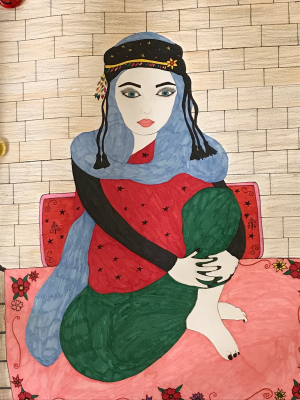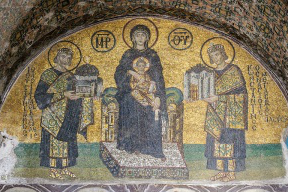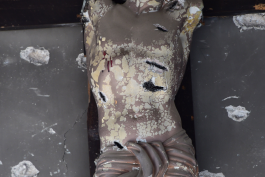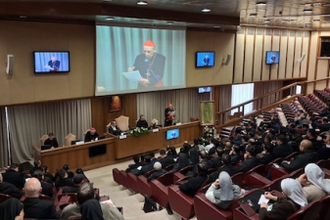Iraq: Yezidi women languish in remote camps, while thousands still held by IS

Work by one Yezidi survivor in art therapy group
The WhatsApp Rape Market
"Every time I go shopping to buy food for my family, I have a flashback to when I was bought and sold. I can barely get through the transaction without running out of the store."
Mary (not her real name) was held captive by Islamic State (IS) for two and a half years, and raped daily. She was put up for sale a dozen times, sometimes bought by men who had been her neighbours before the conflict. A popular means of selling Yezidi women like Mary was on WhatsApp: the modern world meets the medieval one.
When IS finally retreated, many Yezidi women were freed. However, 3,200 Yezidi girls and women are still missing, with no apparent official effort to locate them. Nor have any IS members or collaborators been held accountable for the suffering of Mary and thousands of other women.
August 3rd marks the fourth anniversary of the IS attack on Sinjar in northern Iraq, where the Yezidi minority lived. The Yezidi faith pre-dates Christianity, and has some links to Zoroastrianism. One of its angels is a peacock, and strangers (such as your correspondent) are welcome to observe the Yezidi's benevolent and moving rituals at its most important temple in Lalish, in the mountains of what is now Iraqi Kurdistan.
However, the Yezidi are regarded as devil-worshippers by intolerant Muslim sects. Hence the determination of Islamic State to kill Yezidi men en masse, and to humiliate the women and girls. IS destroyed the Yezidi's homes in Sinjar, meaning they have nothing to which they can return. Hence thousands of Yezidi remain in camps in northern Iraq and Iraqi Kurdistan. Having enjoyed a modern, First World lifestyle with all its comforts, they now live in the most basic conditions. In summer, the temperature is in the 40s C, and their camps are in remote and inhospitable locations. There are minimal resources available for these most forgotten of IS's victims. If a Yezidi women is fighting cancer, but she lacks the money for transport to the hospital, or treatment once there, she has no options.
Unfortunately, many media reports about the suffering of the Yezidi focus on their sexual slavery in an almost voyeuristic manner. Having been used and cast aside by IS, some survivors feel violated once more when journalists pump them for the salacious details of their incarceration, and then leave, without arranging trauma counselling or even a donation to the charities offering psychotherapy to the Yezidi.
Nor is there healing in the form of justice. Although the international community has determined that IS actions amount to a genocide of the Yezidi people, there have been no prosecutions specifically relating the the ethnic cleansing, mass killing and abuse of the Yezidi. There seems to be a lack of political will to recognise that the Yezidi were specifically targeted for genocide, or that rape is a weapon of war. That lack of will may be connected to the prevailing view that Iraq's history is Muslim. School books perpetuate the view that history started when Islam arrived. The Christian, Jewish and Yezidi minorities, all of whom were there long before the Muslims, have been written out of the national story.
Sweden's foreign minister, Margot Wallstrom, is the UN's former special representative on sexual violence. She recently wrote in the New York Times, "Sexual violence in conflict is one of the most cruel, inhuman and vicious acts imaginable....I often heard people say that sexual violence was inevitable. That it was sad and unspeakable, but an unavoidable consequence of conflict....if sexual violence can be rationalised, just imagine the other forms of domination over women that are accepted or seen as unavoidable."
While the horrors of the recent past weigh on the Yezidi, the survivors are also aware that the jihadists who targeted them have not been vanquished. IS members have simply shaved off their beards and melted back into the population. In addition, they cannot forget the 3,200 women and girls still being held by IS, most likely sold on to enslavement in brothels in Turkey, or the apparent absence of any attempt to find them.
Yet, when visiting one Yezidi camp last month, it was striking how determined the survivors are to keep alive their culture and their stake in the region. The Yezidi have endured numerous previous genocidal acts over the centuries, and yet they are still there. Although their cause has been largely forgotten by the international community, a few charities are providing help on a practical level with very limited resources. But the Yezidi also need rights and representation.
A small NGO trying to meet many of these needs is the Free Yezidi Foundation.
Donations can be made at www.FreeYezidi.org


















